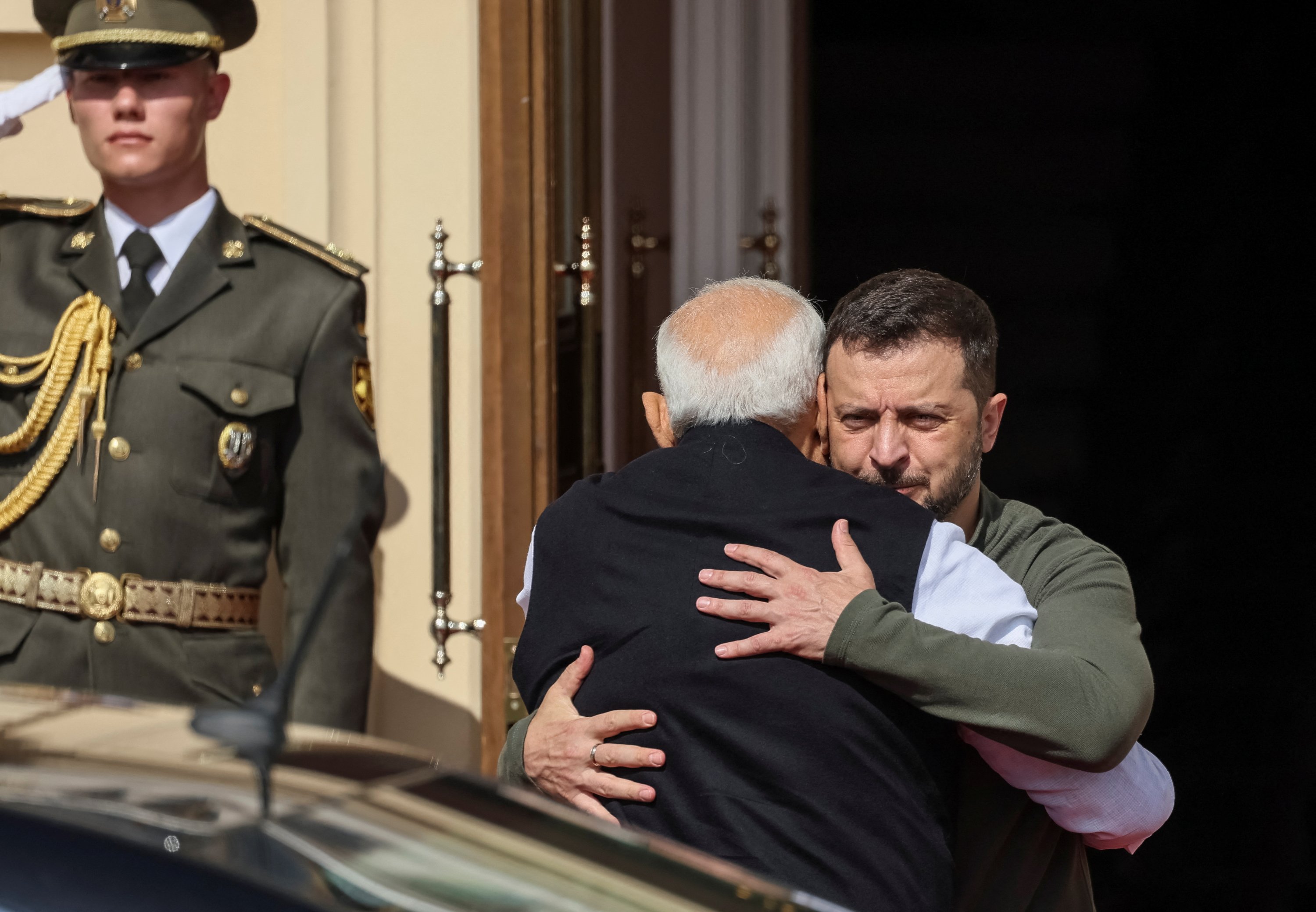© Turkuvaz Haberleşme ve Yayıncılık 2026
Indian Prime Minister Narendra Modi made a historic visit to Kyiv on Friday, meeting Ukraine's leader Volodymyr Zelenskyy in a bid to find a solution to the ongoing war with Russia.
Modi, who became the first Indian premier to visit Ukraine, embraced a visibly emotional Zelenskyy at the Mariinsky Palace.

The Indian leader is positioning himself as a potential peacemaker between Moscow and Kyiv.
However, his visit comes at a crucial juncture in the two-and-a-half-year conflict, with a diplomatic resolution seeming more distant than ever. Kyiv's forces are launching a significant incursion into Russia's Kursk region, while Moscow's troops continue to advance in eastern Ukraine, recently claiming control of several towns and villages.
"No problem can be resolved on a battlefield," Modi said in Poland on Wednesday before heading to Ukraine.
India, he said, supports "dialogue and diplomacy for restoration of peace and stability as soon as possible."
But it is unclear if Modi could be an effective dealmaker.
The 73-year-old has good relations with Russia and met President Vladimir Putin in Moscow in July. He was criticized for hugging Putin during that visit, hours after a Russian strike on a Kyiv children's hospital. At the time, Zelenskyy called it a "devastating blow" to peace efforts.
On Friday, Zelenskyy said he and Modi had "honored the memory of children whose lives were taken by Russian aggression." "Children of every country deserve to be safe. We must make it possible," Zelenskyy said in a post on Telegram.
During his visit to Moscow last month, Modi told Putin that "war cannot solve problems" and that seeing "innocent children murdered ... is pain that is unbearable."
Ahead of his arrival in Kyiv, Modi said he planned to "share perspectives on the peaceful resolution of the ongoing conflict" with Zelenskyy.
While India has historically warm ties with Russia, it also seeks closer security partnerships with Western nations as a counterbalance to its regional rival China. New Delhi has avoided explicit condemnation of Russia's 2022 invasion and has abstained on UN resolutions that criticize the Kremlin, instead urging both sides to resolve their differences through direct dialogue.
Moscow also remains a key supplier of oil and weapons to India. However, Russia's invasion of Ukraine has had a human cost for India, with several reports of Indian citizens being killed fighting for Russia. In February, New Delhi said it was pressing the Kremlin to send back some of its citizens.
In the first year of the invasion, Putin publicly acknowledged that Modi had "concerns" over Moscow's actions in Ukraine. Western powers have in recent years pressured New Delhi to distance itself from Russia.
Ukraine has said that one of its aims in launching the surprise Kursk incursion on Aug. 6 was to force Moscow into "fair" negotiations. While there were no signs of serious talks to end the war before then, Russia has said the counter-offensive now makes them impossible.
Putin earlier this year said Kyiv would have to abandon territory in four of its regions, which Moscow claims to have annexed, as a precondition to opening talks – a hardline demand that drew scorn in Kyiv and the West. Zelenskyy has also ruled out direct negotiations with Putin.
Even as Moscow scrambles to fend off the Ukrainian attack into its Western Kursk region, its forces are still advancing in the eastern Donetsk region, capturing several towns and villages in recent days.
Kyiv has ordered some evacuations from Pokrovsk – a key strategic and logistics hub in the region – amid fears it could fall to Russia.
As Modi arrived in Kyiv, Ukraine reported that a Russian strike killed two people in the northeastern Sumy region and that two others were pulled from the rubble caused by another strike on the Kharkiv region further south a day earlier.
The United Nations has verified more than 10,000 civilian deaths in Ukraine since Russia's invasion in February 2022 but says the true figure is likely much higher.
